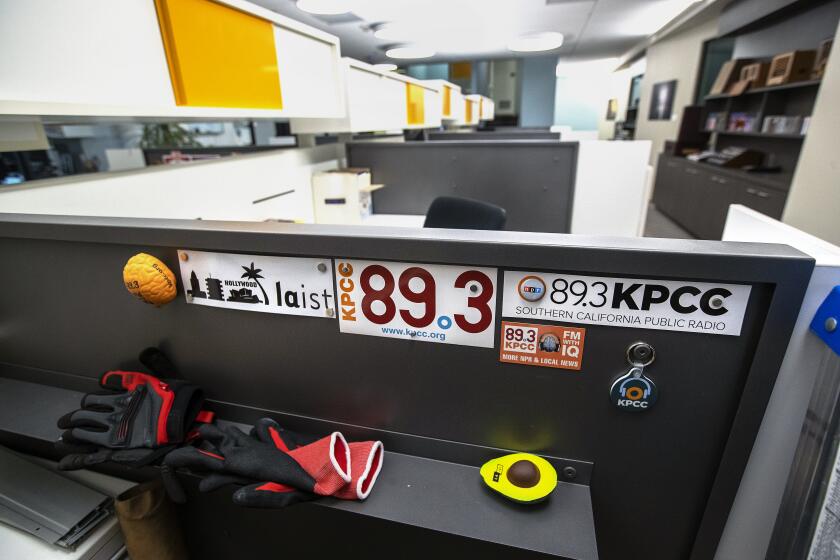Oracle Plunges in Record Sell-Off : Worries over Earnings Growth Are Catching Up on Wall Street
U.S. corporate profits have been rising at a brisk pace for six years, and all along some wrong-headed Wall Street analysts have continually, and prematurely, argued that the boom couldn’t last.
Will the seventh year finally bring the long-feared earnings famine--and with it the best excuse yet for an end to the 1990s stock bull market?
That thought sent shudders through the market on Tuesday, as software leader Oracle Corp. triggered a broad sell-off in technology stocks after reporting dismal earnings in its fiscal quarter ended Nov. 30.
The tech-heavy Nasdaq composite stock index tumbled 30.99 points, or 1.9%, to 1,620.55. The Dow Jones industrials slid 61.18 points, or 0.8%, to 8,049.66.
If Oracle’s news had occurred in a vacuum Wall Street might have been less disturbed. But with three weeks yet to go before the end of the fourth quarter there is already more than the usual amount of concern about near-term corporate earnings.
East Asia’s economic crisis is getting much of the blame for the earnings jitters. Asian companies and consumers, their currencies sharply devalued--, have slashed spending on imports. What’s more, those weak currencies mean that whatever sales a U.S. company has in the region will be translated into fewer dollars.
Of course, it isn’t as if this should be a surprise to investors; everyone knew there would be some U.S. fallout from Asia’s woes, given that the region buys about one-third of U.S. exports.
Still, the rally in many U.S. multinational stocks in recent weeks suggested that investors wouldn’t believe there could be collateral damage to their stocks until it actually occurred.
For Oracle, the damage was much more than a flesh wound: The company specifically said that its quarterly revenue growth in the Asia-Pacific region, while 15% in local currencies, amounted to just 1% growth in dollars. And analysts say that some potential Oracle corporate customers in Japan simply can’t get the bank credit they need to buy pricey software.
Likewise, several analysts who follow Coca-Cola this week trimmed their 1998 earnings estimates for the company, citing the effects of the strong dollar. And Boeing on Monday warned that many jet orders from Asian airlines could be delayed.
Wall Street analysts now seem to be taking the Asian threat seriously, says Chuck Hill, research chief at earnings-tracker First Call in Boston. A growing number of analysts are cutting fourth-quarter profit estimates for the companies they follow.
As of mid-October, analysts overall had expected earnings for the Standard & Poor’s 500 list of blue-chip companies to rise 12.2% in the fourth quarter versus the same quarter of 1996. Now the overall figure has shrunk to 9.4% estimated growth, Hill says.
It isn’t unusual for estimates to decline during the course of the quarter; analysts often are too optimistic, and pare estimates as earnings-reporting season nears. But Hill says the pace of the decline so far in the S&P; 500 figure is faster than he expected.
At the same time, however, Hill says few analysts have trimmed their 1998 company estimates. The overall estimate for the S&P; 500’s earnings growth in the first quarter is a spectacular 17.3%--a number that Hill and other Wall Street pros believe is way out of sight, given the Asian fallout.
But how weak will earnings actually turn out to be in the current quarter, and in 1998?
Asia will be a drag, for certain. But as last Friday’s November jobs report showed, the U.S. economy remains robust--and that’s still the source of the bulk of the profits earned by most U.S. firms.
The National Assn. of Purchasing Management’s annual survey of its member manufacturing companies shows 59% of companies responding are optimistic about their business’ prospects over the next 12 months. That’s the highest reading since May, 1988.
Some Wall Street bears, like brokerage Morgan Stanley, Dean Witter’s Barton Biggs, say that optimism isn’t realistic. Undermined by Asia and other competitive factors, S&P; 500 earnings growth is on the verge of slowing to a 4% to 5% annual rate, Biggs argues. That’s a far cry from the double-digit gains of recent years, and far too little to support today’s near-record stock prices, he says.
Richard Bernstein, who watches earnings closely for Merrill Lynch, also expects a slowdown. But he notes that, in fact, “Earnings growth has been slowing, off and on, for three years now.”
Does a further slowdown have to spell the end of the bull market? Not necessarily. Because if slower earnings growth in 1998 stems in part from slower world economic growth, that could mean sharply lower interest rates ahead--which would be supportive of stocks.
While the focus in the near term will be on earnings, Bernstein says, “We see the fate of the stock market now tied to interest rates.”






